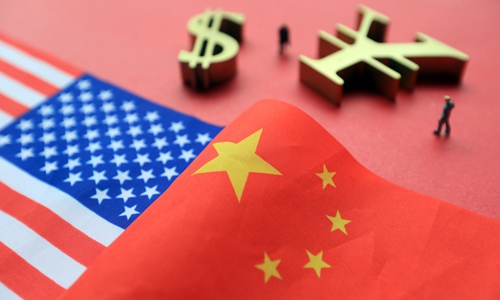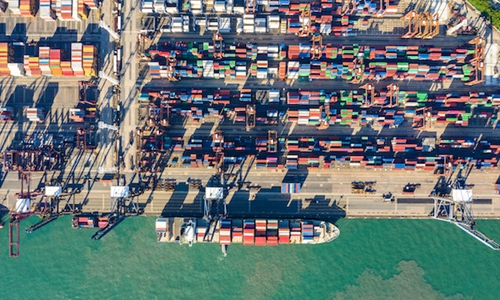HOME >> SOURCE
Correcting mistakes a good start for phase one trade deal: experts
By Xie Jun and Wang Cong Source:Global Times Published: 2020/1/14 20:43:40

Photo: IC
A US decision to remove its designation of China as a currency manipulator in an apparent goodwill gesture ahead of the looming phase one trade agreement was met with widespread criticism on Tuesday in China, where many argued that the label was a mistake in the first place.However, the US move also showed signs that Washington is returning to rationality instead of political bullying tactics in the wake of the phase one agreement that could be beneficial to China, the US and the global economy in the long run, some Chinese experts said.
In its latest foreign exchange report on Monday (US time), the US Treasury Department reversed its earlier decision to label China as a currency manipulator, saying that terms in the phase one trade agreement addresses its concerns over China's practices.
In August 2019, when trade tensions between China and the US were running high, the US moved to brand China a currency manipulator without any concrete evidence, even by its own standards. Though the move was largely symbolic, it drew a fierce response from Chinese officials, who labeled the decision as politically motivated rather than fact-based.
Asked about the US decision, Geng Shuang, a spokesperson for the Chinese Foreign Ministry, was unmoved.
"China was never a currency manipulator," he told a routine press conference in Beijing on Tuesday, adding that the latest US decision was in line with the facts and the consensus of the international community.
Part of deal
Coming just two days before China and the US are scheduled to sign the phase one deal on Wednesday, the US decision on Monday was part of the agreement and meant to send a goodwill gesture ahead of the signing ceremony, analysts noted.
"The results of the China-US trade consultations already showed that China is not a currency manipulator. If the US keeps that label, it would be paradoxical to the trade agreement," Zhang Yansheng, chief research fellow at the China Centre for International Economic Exchanges, a government think tank in Beijing, told the Global Times on Tuesday.
Though the text of the agreement has not been released, Chinese officials said that there will be a chapter in the deal that will address foreign exchange rates.
Specifically, the deal includes a provision that both sides reaffirm their commitment to avoid a competitive devaluation of their currencies and to keep close contact over the foreign exchange market, according to sources familiar with the matter.
The deal also stressed that the two countries will respect each other's monetary sovereignty, the sources said. However, at a time when many in the US and China are single-mindedly focused on who will win or lose the phase one trade agreement, some in China argued that the US move was not a meaningful concession from the US but a correction of its own mistake.
"It is a very wrong and absurd decision to call China a currency manipulator and the US knows that it would be disgraceful not to change that decision," Zhou Yu, director of the Research Center of International Finance at the Shanghai Academy of Social Sciences, told the Global Times on Tuesday.

China's total trade value from January to November, 2019 recorded at 28.5 trillion yuan ($4.05 trillion), up 2.4 percent year on year. Photo: VCG
Long-term benefits
Still, some experts said the US move should be a welcome step for the smooth completion of the phase one agreement, which has long-term benefits to all parties involved.
"Removing the currency manipulator label shows that the US is sending a friendly signal," Song Guoyou, director of the Fudan University's center for economic diplomacy in Shanghai, told the Global Times.
Furthermore, some experts said that the focus should not be on the petty discussions over who gained more from the phase one agreement but should be on the long-term positive impact of the agreement on both economies as well as on global growth.
"This trade agreement covers more than just trade. If both sides agree, it means it will be good for both," Dong Shaopeng, an adviser to the China Securities Regulatory Commission, told the Global Times on Tuesday, adding that both sides must have made compromises to reach such a deal.
Under the agreement, among other things, China will increase imports of US products such as agricultural, energy and manufactured goods, while the US has committed to roll back its tariffs on Chinese goods in phases, Chinese officials said.
"Compromising is not losing, but maintaining cooperation is winning," Dong said, noting that the deal will be good for economic growth and the financial markets of both countries.
RELATED ARTICLES:
Posted in: ECONOMY